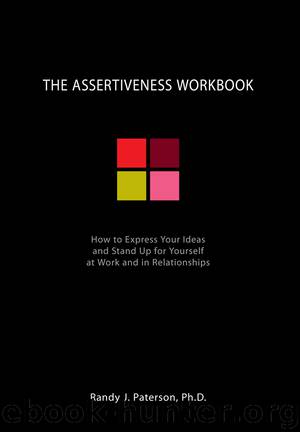Assertiveness Workbook by Randy Paterson

Author:Randy Paterson [Randy J. Paterson]
Language: eng
Format: epub, pdf
Tags: PSYCHOLOGY/ Self-Help
ISBN: Assertiveness Workbook
Publisher: New Harbinger Publications
Published: 2011-05-16T04:00:00+00:00
Like most people, you probably use all four styles at different times. Regardless of which style you checked, it may be helpful for you to practice offering your opinion more openly. Here are some tips:
•Relax before you start. You will be able to think more clearly and express yourself better if you are calm. Breathe slowly and deeply as you think about what you want to say. You may wish to use the diaphragmatic breathing exercise presented in chapter 2. Keep your body relaxed as you give your message.
•Rehearse. Briefly go over what you plan to say before you say it. Try to word your message clearly. Although ideally you might wish to respond unrehearsed most of the time, coming up with an alternative to your usual style may take a bit of practice. Eventually, the words will come more easily and spontaneously to you.
•Don’t signal a lack of confidence. Perhaps your mind is not entirely closed. You might be willing to change your opinion in the face of new information. Nevertheless, avoid signaling a feeling of inferiority about the issue. “I could be completely wrong about this—and you can tell me if I am—but I have sort of been thinking that.…” If you are undecided, say so. If you feel strongly, say so. But don’t undermine your own opinion out of the fear that others may disagree.
•Feel free to signal your openness to other views. Sometimes you may wish to indicate that although you have an opinion, you are willing to entertain other ideas. “I don’t have a strong preference, but I’d like to try a seafood restaurant.”
•Own your message. When offering your opinion, use an “I” statement to show that you take responsibility for your view. “My own feeling on abortion is that.…” When we feel a lack of confidence, it is tempting to appeal to authorities. “The Surgeon General says.…” Perhaps you imagine that the people to whom you are speaking will be less willing to disagree with the authority than they would be with you. If they do disagree, they will be contesting the authority’s position, not yours. You can just step out of the way and pretend that you were just reporting what the authority said, not expressing your opinion at all. “Don’t blame me, that’s what he said.” This is dishonest. If it is your view, say so. Own it. Later on you might be willing to give reasons for your opinion (which might involve authorities), but it is still your opinion. In the initial statement it is appropriate to acknowledge this. “I’m opposed to clearcutting old-growth forests.”
•Don’t apologize for having an opinion. Apologies are appropriate when you have overstepped your rights. You have a right to have an opinion, so you don’t have to apologize for it. Avoid saying things like “Forgive me for saying this…” or “I’m really sorry, but I think.…” Is it true that you regret having a point of view?
•You are not the source of all truth. It is
Download
This site does not store any files on its server. We only index and link to content provided by other sites. Please contact the content providers to delete copyright contents if any and email us, we'll remove relevant links or contents immediately.
The Compound Effect by Darren Hardy(8949)
Wonder by R.J. Palacio(8573)
Atomic Habits: Tiny Changes, Remarkable Results by James Clear(8327)
Becoming Supernatural by Dr. Joe Dispenza(8204)
Wonder by R. J. Palacio(8100)
Change Your Questions, Change Your Life by Marilee Adams(7762)
The Road Less Traveled by M. Scott Peck(7594)
Born to Run: by Christopher McDougall(7121)
Daring Greatly by Brene Brown(6504)
Big Magic: Creative Living Beyond Fear by Elizabeth Gilbert(5757)
Grit by Angela Duckworth(5605)
The Slight Edge by Jeff Olson(5410)
Men In Love by Nancy Friday(5234)
The Wisdom of Sundays by Oprah Winfrey(5153)
You Are a Badass at Making Money by Jen Sincero(4925)
Fear by Osho(4728)
The Miracle Morning by Hal Elrod(4716)
The Four Tendencies by Gretchen Rubin(4595)
Rising Strong by Brene Brown(4451)
